Last Updated on July 31, 2021
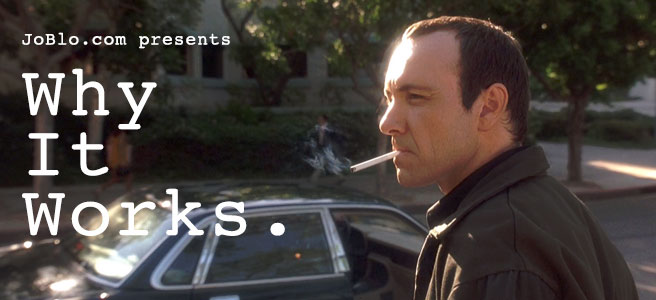 Why It Works is an ongoing column which breaks down some of the most acclaimed films in history and explores what makes them so iconic, groundbreaking, and memorable.
Why It Works is an ongoing column which breaks down some of the most acclaimed films in history and explores what makes them so iconic, groundbreaking, and memorable.
****SPOILERS AHEAD****
X-MEN: APOCALYPSE hits theaters this weekend, marking Bryan Singer's fourth time at the helm of an X-Men movie. Since the first X-MEN, we haven't seen much in the way of smaller, intimate films from Singer, with the director opting for mutants, Kryptonians, and beanstalks instead. This week, we're going back to the beginning and looking at THE USUAL SUSPECTS, the first film to bring the filmmaker into the public eye. THE USUAL SUSPECTS follows a group of smart ass criminals and angry cops, tells an intricate, non-linear story, and features an ending that should make audiences furious but instead leaves them smiling. Here's why it works:
WHY WE LIKE THE CHARACTERS:
It's the age-old question of how to make "bad guys" sympathetic, likable, and, at the very least, watchable. We know the five suspects are criminals to varying degrees, but we're not given much information about what they have or haven't done. Instead, we see the authorities intensely grilling them for a crime they don't seem to have committed. This quickly sets the precedent that our five protagonists are the underdogs, oppressed by the feds, cops, and customs agents alike. Granted, the dynamics of the characters on either side are not so simple, but it's the first impression that tells us who we're rooting for. Bryan Singer went so far as to leave an outtake in the film, where the cast cracks up during the lineup. Seeing the suspects share a genuine moment of levity helps us get comfortable and reminds us they're just regular guys. On that note, it's also fun that they're colorful, flawed characters rather than criminal masterminds. Gabriel Byrne's Keaton appears to have gone straight, Stephen Baldwin's McManus has a short fuse, Kevin Pollack's Hockney is a wise-cracking hijacker, Benicio del Toro's Fenster is nigh unintelligible, and Kevin Spacey's Verbal Kint is such a sad sack, there's no way he could be up to no good…
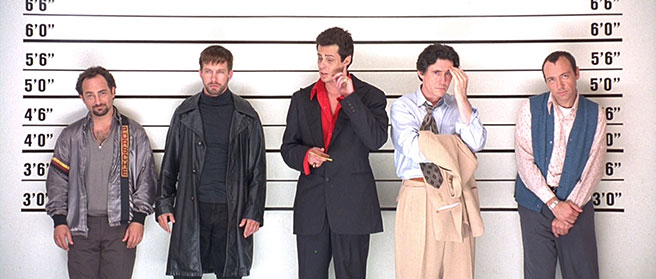 Raise your hand if you had a poster of these guys on the wall of your college dorm room.
Raise your hand if you had a poster of these guys on the wall of your college dorm room.
WHY WE CARE:
Many of the plot points and individual scenes of THE USUAL SUSPECTS play more like a network procedural than a riveting thriller- a crime happens, the authorities investigate, suspects are interrogated; super. Bryan Singer and screenwriter Christopher McQuarrie are certainly aware of this, and use non-linear storytelling, mystery, suspense, and a bit of action to keep the film gripping from moment to moment. For starters, the film opens with the climactic ship massacre, and though we see some of it, we're given very little information as to what actually went down. Right off the bat, we're handed a mystery we'll be spending the rest of the film trying to solve. Enter Kobayashi, Keyser Söze, and the idea that Keaton may be the mastermind behind it all, and every piece of information simply raises more questions and makes us that much more hungry for an answer. As we follow the bits and pieces of Verbal's recollection, we can dip in and out of key moments in the story without ever getting bogged down in any particular scene or plot point. Incidentally, this becomes a treat for future viewings, as we realize Verbal is purposefully dropping specific details and bits of misinformation as it suits his needs. Finally, none of this works if the scenes themselves aren't entertaining, and so we see some of the jobs the group takes on, their tense interactions with Kobayashi, Verbal's interrogation, and Fenster's demise along the way with even a layer of humor over everything to keep the film from feeling too dark and brooding.
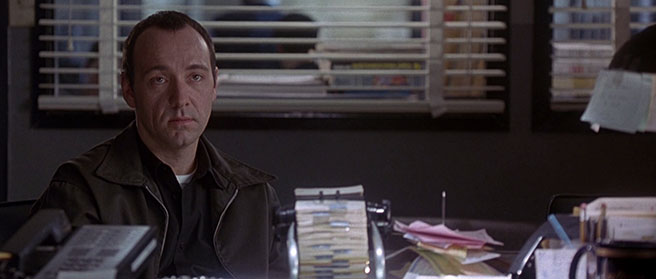 First rule of movie watching: no matter how much you love him, never trust Kevin Spacey.
First rule of movie watching: no matter how much you love him, never trust Kevin Spacey.
WHY WE'RE SATISFIED:
Okay, this is the big one. The interrogation concludes with Kujan figuring out that Keaton must have been Söze, which Verbal eventually admits, breaking down in tears in the process. As Verbal walks away, Kujan realizes most of the story was made up, with Verbal pulling words and ideas from items in the office. We watch as Verbal loses his limp, lights up a cigarette, and gets into a car with "Kobayashi." At first glance, it's the kind of total cop-out ending movies and shows stopped doing long ago, because no one wants to find out the entire story they just heard didn't happen (or rather didn't happen within the world of the narrative). On the other hand, if you are going to do it, be amazing at it. THE USUAL SUSPECTS pulls it off largely thanks to the Keaton double bluff. Like Kujan, as Verbal's story unfolds, we start to suspect Keaton, which has us feeling ahead of the curve. When Kujan puts the pieces together and Verbal breaks down, we feel satisfied, like we outsmarted the characters and the writers alike. When Kujan's final revelation has us realizing our mistake, we're more delighted than disappointed, applauding the filmmakers for pulling a fast one over on us as we realize the clues were there all along.
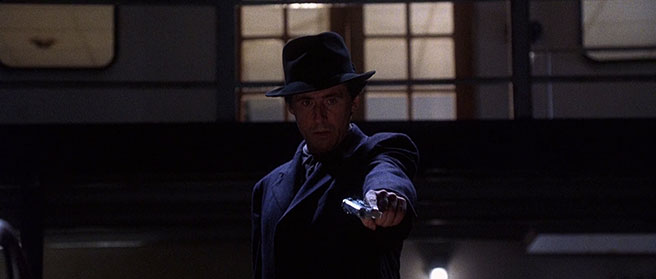 When Gabriel Byrne kept asking why Bryan Singer had him in this outfit, Singer eventually admitted, "because I'm a big MILLER'S CROSSING fan!"
When Gabriel Byrne kept asking why Bryan Singer had him in this outfit, Singer eventually admitted, "because I'm a big MILLER'S CROSSING fan!"
WHY WE REMEMBER:
I remember very clearly the first time I saw THE USUAL SUSPECTS. About two-thirds of the way through, I turned to my friend who had already seen it and asked, "Is Kevin Spacey Keyser Söze?" He looked at me blankly for a second, laughed nervously, and said, "what? No!" Some movies throw a twist at you with no rhyme or reason, while the great ones leave clues along the way. What's more is that much of the story Verbal tells is true, just not exactly in the way he tells it. Look at FIGHT CLUB or THE SIXTH SENSE. The clues are there when you watch the film again, but more importantly, most of the plot points actually happen- it's just the circumstances under which they happen that we don't fully appreciate until we have all the information. Upon repeat viewings, rather than watching THE USUAL SUSPECTS bitterly thinking, "well, none of this happens, so who cares," we enjoy the story we're being told while piecing together which moments were orchestrated by Verbal and which parts are complete fabrication. On the technical side, Christopher McQuarrie's script, Bryan Singer's direction, the cinematography, and the production design all flirt with a film noir, gumshoe style while maintaining a gritty overtone to keep the film both classic and modern. The characters bring an element of fun to the film (not to mention being brilliantly cast), and John Ottman, bringing his dual talents to the film as both composer and editor, keeps the pace quick and the tension high. Bryan Singer is still a strong filmmaker to be sure, but the bigger and more ambitious his movies get, the more I can't help but feel like a return to his earlier form would be a welcome change of pace.
Thoughts? What else worked for you? What didn't? Strike back below!
If you have any movies you'd like to see put under the microscope, let us know below or send me an email at [email protected].






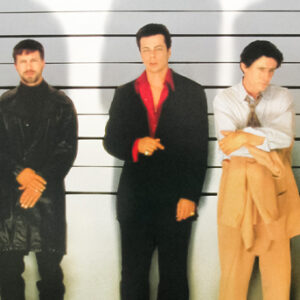


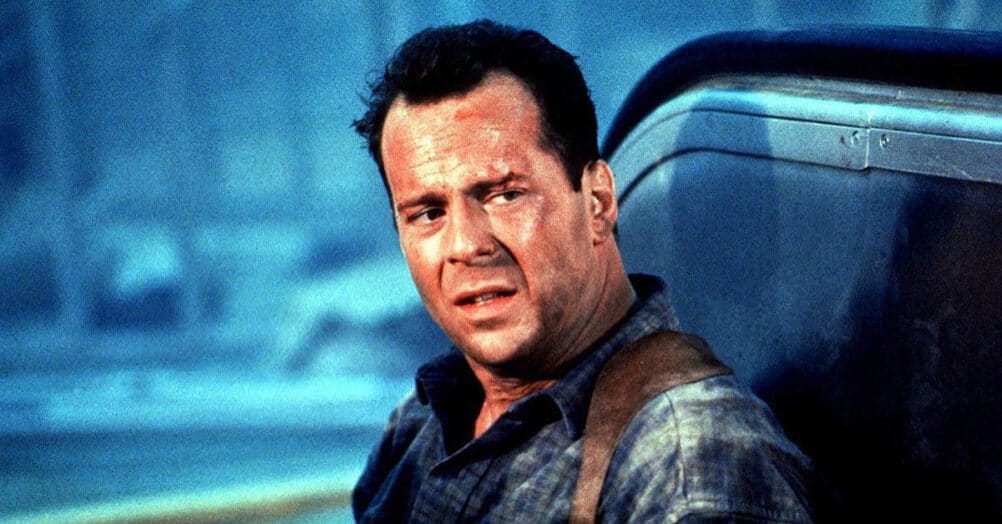




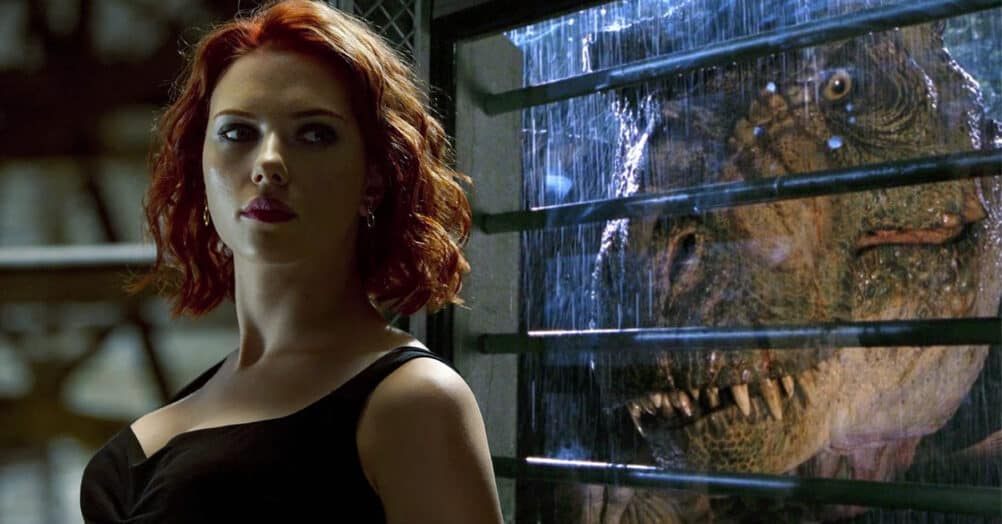



Follow the JOBLO MOVIE NETWORK
Follow us on YOUTUBE
Follow ARROW IN THE HEAD
Follow AITH on YOUTUBE